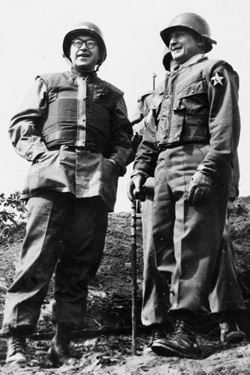 |
|
|||||||||
|
1913 “Marshall Field” had just been redubbed “The University of Chicago Athletic Field,” but the November Magazine noted a reason to change the name again. Many at the University suggested “Stagg Field,” arguing that “to call the exercise-ground of our young soldiers of sport by the name of their honored general would be appropriate, and wise.” The writer supported naming the field after Amos Alonzo Stagg, Chicago’s football coach since 1892, but noted that the change did not have to occur immediately. “That some day it will be ‘Stagg Field’ a great many people believe. Perhaps as long as we are privileged to have the ‘Old Man’ actively engaged among us, ‘The Athletic Field’ will serve as well as any other name.”
1953 The October Magazine interviewed Walter Johnson, AM’38, PhD’41, a Chicago history professor just back from accompanying Adlai Stevenson on the former Illinois governor’s world trip. The journey had a few scary moments, Johnson revealed, including when he was shot at in Korea. Particularly frightening was the helicopter crash in the Malayan jungle. Shortly after takeoff the helicopter began to smoke; then it dropped, bumping treetops before landing in a rice paddy. “We had been spotted going down so another helicopter was there almost immediately,” Johnson said, “which was fine because we only had one pistol among us, in guerrilla territory.” Asked what he was thinking as the helicopter fell, Johnson said that he had been too worried to think. Only after landing did he remember that his insurance did not cover military-aircraft flights. 1978 The University’s Computation Center put the fantasy computer game Adventure on campus machines to encourage student computer use and to “dispel the back-of-the-mind uneasiness about ‘electronic brains’ that blocks so many of us from using computers with confidence.” The Magazine predicted that of the two types of computers at the center, one—the 1973 IBM-370, which could process a large batch of punched cards in “only ten minutes”—would remain useful for ten years. Although the writer also forecasted that computer literacy would become more common, he cautioned, “The trouble with such knowledge is that it may very well land one in a cluster room at midnight, hunched over a gleaming CRT screen, and playing Adventure...instead of dreaming our own dreams, snug abed.” In other words, “Progress has its price.” 1993 Students enrolled in Chicago’s summer Archaeological Field School, taught by Jane Buikstra, AM’69, PhD’72, wound up participating in more than the usual classes and excavations when the school’s Kampsville, Illinois, location was severely flooded. As the floods threatened the program’s buildings and dig sites, the graduate and undergraduate students, staff, and Kampsville residents hastily built sand levees. When a levee broke and flooded the “Mound House” site, students moved to dig on higher ground. The Magazine reported that the level of damage to the Mound House could not be determined until the eight feet of water that covered the site drained.—D.G.R. |
|
Contact
|


